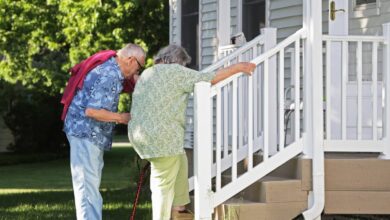
Inna and Vladimir Giterman tinkered with several business ideas before finding their niche — and their version of the American dream — with crepes.
Both immigrants, and both deaf, the Gitermans started Crepe Crazy in 2007. What began as a mom-and-pop shop at festivals has grown into a full-blown family business with multiple food trucks, two brick-and-mortar restaurants in Texas and a franchise location in Baltimore.
Everyone who works for the company, including the Giterman’s two adult children, are either deaf or “deeply involved with the deaf community,” Inna Giterman said in an email. Staff communicate using American Sign Language. Customers who can’t sign still order with their hands: by pointing.
Crepe Crazy is one of roughly 1.8 million businesses in the United States that is owned by someone with a disability, according to the American Community Survey conducted by the U.S. Census Bureau (though experts believe that number to be conservative).
And while the path to entrepreneurship is rarely easy, business owners with disabilities often need to overcome additional challenges, like societal misconceptions, barriers to financing, extra living costs and lack of accommodations, among other things.
Layers of funding barriers
Entrepreneurs often have to leverage personal savings, credit cards or even a personal loan to fund their business at the outset. But that’s complicated for founders with disabilities, especially if they rely on Supplemental Security Income (SSI) and Medicaid, which have income and asset limits, says Nikki Powis, director of small-business programs at the National Disability Institute (NDI).
“ A person receiving SSI is only allowed to have $2,000 in assets,” Powis says. “That makes it very difficult to save money to start a business — and do it yourself — because you can’t have more than $2,000 in your bank account.”
There are workarounds, including leveraging ABLE accounts, tax-free savings and investment accounts that don’t count toward one’s asset total. Business owners should also tap the expertise of a professional to help with benefits planning, Powis says, adding that the NDI can help connect people with those experts.
“Yes, there are barriers and challenges, but you need to find people who are experts that can help you navigate that,” Powis says. “And it should never stop somebody from moving forward with their dreams.”
Read: Small-business financing gets tighter; try these tips if you need a loan now
Overcoming stigma
Securing funding with business loans or venture backing often requires a higher bar for entrepreneurs with disabilities, too. In part because banks, loan officers and investors frequently underestimate what people with a disability are capable of accomplishing.
That stigma can color nearly every business interaction, from winning contracts and customers to leasing commercial real estate.
“I would say probably 99.5% of the people that I’ve talked to said they’ve experienced that at some level or other,” Powis says, citing several examples.
These include one business owner who has lost contracts after the other party realized he had a disability. And a female founder who was told by an investor, “Come back to me when you have a male counterpart without a disability.”
Community development financial institutions like DreamSpring and the Disability Opportunity Fund are working to get business loans to more entrepreneurs with disabilities. Organizations like 2Gether-International, a startup incubator for disabled founders, and Communication Service for the Deaf’s Social Venture Fund also offer opportunities for funding, coaching and community with peers.
Changing the narrative
Diego Mariscal sees disability as a strength rather than a weakness for entrepreneurs, and he started 2Gether-International to help rewrite the script surrounding people with disabilities.
“Oftentimes, you talk about disability as something that needs to be accommodated or fixed or cured,” says Mariscal, who has cerebral palsy. But in reality, people who live with a disability are resilient as a default — and that’s a “competitive advantage,” he says.
“As disabled people, we have to figure out how do you get dressed, how do you drive, how do you communicate. We have to figure out how to live in a world that is not built to fit our needs,” Mariscal says. “Those skills, those survival skills, can be translated into entrepreneurship skills.”
The Gitermans are changing the narrative, too, one customer at a time. While customers come to their food trucks and restaurants for tasty crepes, they also get a glimpse at a thriving business run almost entirely by deaf people. This leaves an impression.
“We appreciate that they come in for food because they know it’s uniquely good,” Inna Giterman said. “[But] it is more satisfying knowing that they leave with more than just a happy stomach.”
More From NerdWallet
Kelsey Sheehy writes for NerdWallet. Email: ksheehy@nerdwallet.com. Twitter: @KelseyLSheehy.
Source link





